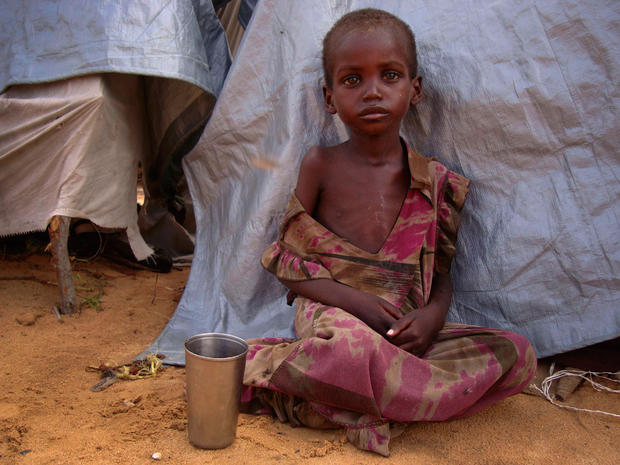UN: Somalia needs $1B, more troops amid famine
With attacks against fleeing refugees increasing at the Kenya border, and gangs and warlords still present in Mogadishu after the militant Al-Shabaab vacated the capital, the Kenyan police, the African Union forces, and Transitional Federal Government (TFG) military troops are inundated, unable to stop the brutal attacks and rapes, overwhelmed by the mandate to assist the aid organizations in delivering food safely, and unable to keep the peace in a region that is experiencing famine, violence and disease.
At the U.N., the 9,000-strong African Union (A.U.) peacekeeping force, known as AMISOM, is asking for the deployment of the additional 3,000 troops that the United Nation Security Council already authorized. Last year, the African Union asked for more: authorization by the U.N. Security Council of a force of 20,000 (which the African Union approved), an air and sea division, a no-fly zone, and for the Security Council to deploy a U.N. peacekeeping force by transforming the current A.U. force into one of the U.N.'s regular peacekeeping operations.
Complete Coverage: East Africa Famine
East Africa Famine: How to help
Augustine Mahiga, U.N. Secretary-General's Special Representative for Somalia, also called for an additional $1 billion in aid, telling the Council that in the refugee camps, "more than 13 out of 10,000 children under five years old die every day as a result of malnutrition and famine-related diseases. This means that 10 percent of children under five are dying every 11 weeks,"
In January, Secretary General Ban Ki-moon urged U.N. member states to provide urgent military support to Somalia's transitional government to stop "foreign fighters and other spoilers" from turning the Horn of Africa into the next stronghold of international terrorism.
U.N. fears dramatic rise in famine refugees
Children of Somalia's famine flood hospital
80 percent of Somali refugees at camp are female
This week, Somalia's transitional government offered an olive branch to the groups still fighting in Mogadishu, the nation's capital, in order to allow much-needed food aid to flow to famine-stricken residents both inside of the country, and to those who have fled to the Dadaab refugee camp in neighboring Kenya.
With a sense of victory, but still with trepidation, Somalia's President Sheikh Sharif Ahmed declared victory, after the militant group, Al-Shabaab, which has impeded aid efforts, withdrew from the capital.
Several U.N. aid agencies including the World Food Program, U.N. Food and Agriculture Organization, and UNICEF as well as dozens of non-government organizations are sending aid. The U.N. refugee agency, United Nations High Commissioner for Refugees (UNHCR), began airlifting emergency humanitarian aid to Mogadishu, for the first time in five years.
Video: Somalia famine and Syrian violence
Mahiga told CBS News, "The withdrawal of large numbers of insurgents from Mogadishu is a positive development. For the first time in almost 20 years, all of Somalia's capital city has a chance to be under one internationally recognized authority. This is truly a remarkable opportunity and we -- the Somali people and the international community alike -- cannot afford to let the moment slip away unrealized."
So, why has the fighting continued? Into the void that Al-Shabaab has left, there appear to be other groups, including fighting clans, warlords and profiteers. Some aid workers in the field fear that Al-Shabaab could merely be regrouping.
Mahiga told CBS, "Great risks still remain -- pockets of Al-Shabaab fighters continue to engage government and AMISOM forces. Militants are likely to revert to terror attacks and guerilla tactics. Mogadishu itself is also vulnerable, with thousands of famine affected IDPs (internally displaced persons) already in the city and more arriving every day."
The withdrawal of Al-Shabaab might give some hope, but Mahiga said," We must be honest: The situation is fragile, the situation is dangerous, Somalia's long national nightmare is not over yet. But right now, there is momentum on our side. It is imperative we all work together to ensure that these hard won gains on the ground are translated into inclusive governance, security stability, provision of humanitarian assistance and progress on the political front which will ultimate be the key to ensuring the elusive long-term peace the Somali people so richly deserve. The forthcoming Mogadishu High Level Consultative meeting next month will be crucial in defining the political agenda for the following twelve months."


